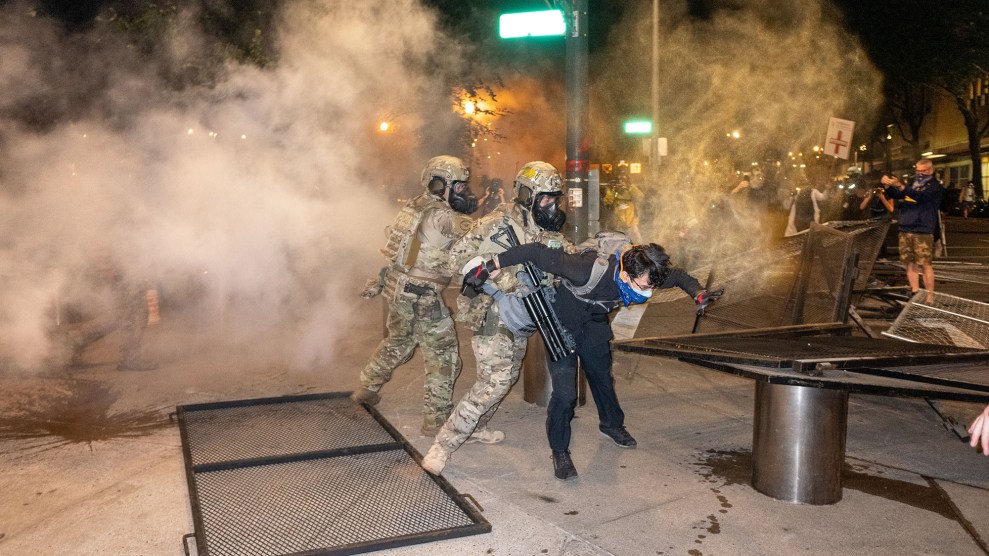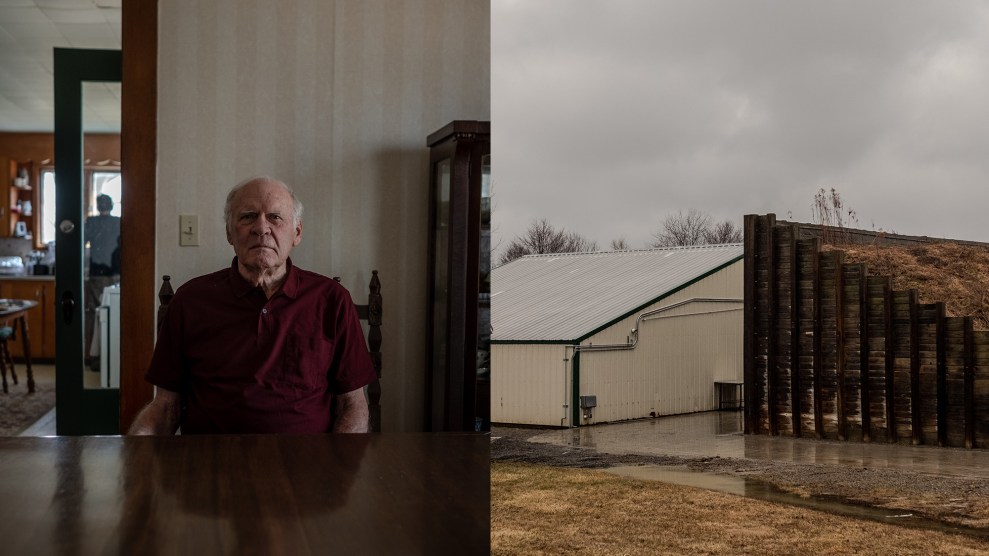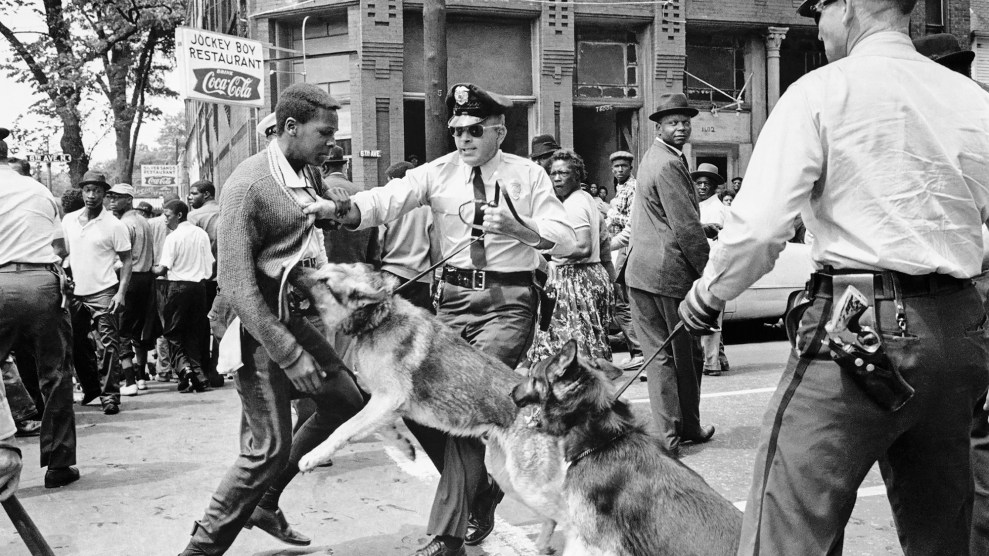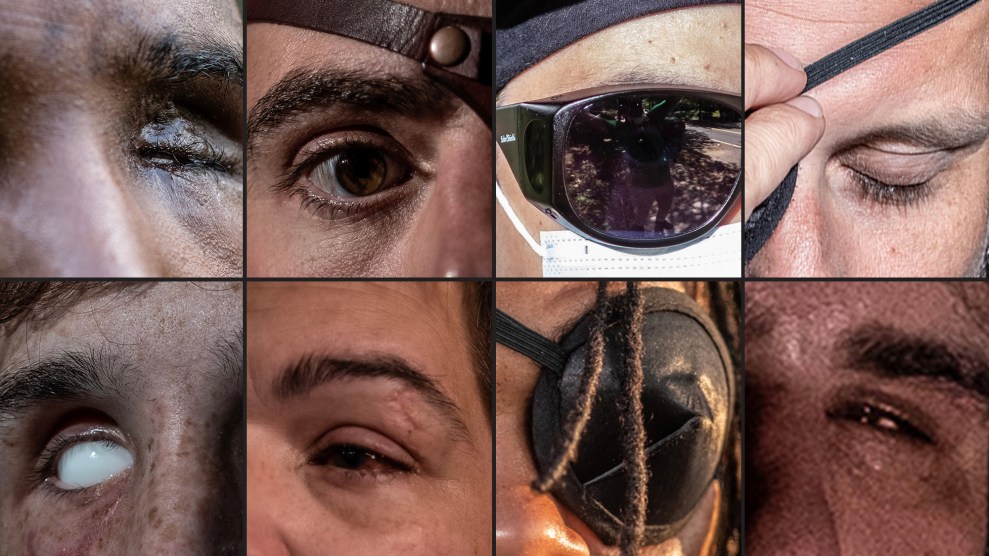A day after cameras caught him and his wife waving guns at peaceful Black Lives Matter protesters walking near their gaudy $1.15 million mansion, Mark McCloskey went on local news and dropped the analogy of the year. “I really thought it was storming the Bastille,” said McCloskey, who like his wife Patricia is a lawyer. “I was terrified that we’d be murdered within seconds. Our house would be burned down, our pets would be killed.”
In fact, the protesters were headed to city hall to rally against Mayor Lyda Krewson, who had recently released the personal information of people who had sent letters calling for the local police to be defunded. But that doesn’t really matter, as far as the law is concerned. What matters is that the McCloskeys—Mark shoeless and in khakis, gripping an AR-15; Patricia in capri pants, brandishing a pistol—were afraid. And that fear gave them special rights.
Much of our gun rights regime is built on the consecration of a landowner’s anxieties into law. When the McCloskeys padded out onto their driveway with their guns, looking like country clubbers newly deployed into the fields of An Lộc, they could count on the impunity extended to them under what’s known as the Castle Doctrine. This was a common-law principle, only recently enshrined into civil law, that says that one’s home is one’s castle, and that an owner has the right to defend it with force. Because protesters were on private property, the McCloskeys could freely take aim. In fact, after the incident, the police told the St. Louis Dispatch they were investigating the protesters—not the McCloskeys—for trespassing and intimidation. The Castle Doctrine is how the Bastille storms back.
A couple has come out of their house and is pointing guns at protesters in their neighborhood #StLouis #lydakrewson pic.twitter.com/ZJ8a553PAU
— Daniel Shular (@xshularx) June 29, 2020
"I really thought it was storming the Bastille." St. Louis pink shirted gunman describes horror as protestors walked along sidewalk adjoining his home. pic.twitter.com/ya2DxajKOQ
— Josh Marshall (@joshtpm) June 29, 2020
As lawyers have pointed out, it’s a bit more complicated than property owners having carte blanche to kill. The McCloskeys would still need to meet the requirements laid out in Missouri’s self-defense statute. But the larger point, as Adam Weinstein writes in the New Republic, is about what the Castle Doctrine represents: an excuse to kill people because you’re scared of someone harming property.
The legal doctrine has underpinned the expansion of racist self-defense legislation, like Florida’s infamous “Stand Your Ground” law, which stopped police from arresting George Zimmerman after he shot Trayvon Martin. While the Castle Doctrine “has for centuries generally immunized people from homicide convictions if they resorted to deadly force while defending their home,” Weinstein wrote for Mother Jones in 2012, “Florida’s law was the first to extend such protection to those firing weapons in public spaces—parking lots, parks, city streets.”
The origins of the Castle Doctrine go back to 1604, when a court case carved out an exemption to the English common-law doctrine of “duty to retreat,” which held that people were obligated to retreat if under attack. In the United States the exemption “turned into a very expansive set of notions about who is allowed to fight back lethally against whom,” as Caroline Light, a historian who traced the history of self-defense in the United States, put it in an interview with the Harvard Gazette. On American soil the Castle Doctrine was adapted to the prevailing racial order. “When people in the U.S. said, ‘A man’s home is his castle,’ what they actually meant was, ‘A white, property-owning man’s home is his castle,’ and he’s allowed to fight back,” Light said. “[L]ethal self-defense has been legalized for the most privileged even if, rhetorically, we celebrate self-defense as something universal to all citizens.”
In 2017, Missouri’s legislature used the Castle Doctrine to expand gun rights in the state, doing away with any obligation to retreat before using deadly force. At the time, law enforcement opposed this expansion, feeling it could be reckless.
One of the state legislators who spoke up against it? Kim Gardner, who was elected to be St. Louis city’s attorney in 2016. “We’re lowering the standard. We are creating the perfect storm,” she said at the time, according to local station KSDK. She is now presiding over how the McCloskey matter will be adjudicated.
Gardner, as city attorney, puts the blame squarely on the couple, despite what police said to the local paper about investigations. “We must protect the right to peacefully protest,” she said.
Statement from Circuit Attorney Kimberly M. Gardner in regards to events over weekend: pic.twitter.com/KqqFHIvL9Q
— Circuit Attorney (@stlcao) June 29, 2020
It’s unclear what sort of investigation Gardner’s office is conducting into the McCloskeys, but the couple have nonetheless hired legal representation: Albert Watkins, a “self-centered, egotistical, and a self-proclaimed expert in all matters,” according to himself.
In a statement to the St. Louis Dispatch, Watkins said that his clients, “as melanin-deficient human beings, are completely respectful of the message Black Lives Matter needs to get out, especially to whites.”
Watkins’ bio is a marvel of self-proclaimed racist and misogynistic accomplishments. His list of noted legal accomplishments include defending the man at the center of controversy involving a rodeo clown wearing a racist Obama mask, successfully defending a “white elementary school principal accused of felonious sexual misconduct involving African American third-grade students,” and driving a survivor of sexual assault to suicide. He also hosts a radio show in which he “waxes poetically about the news and events of the day, employing a decidedly conservative Midwest American mindset…born of ‘rugged individualism.'” This is a quote from the biography on his own website. It’s not hard to see whose ground he’s standing.


















